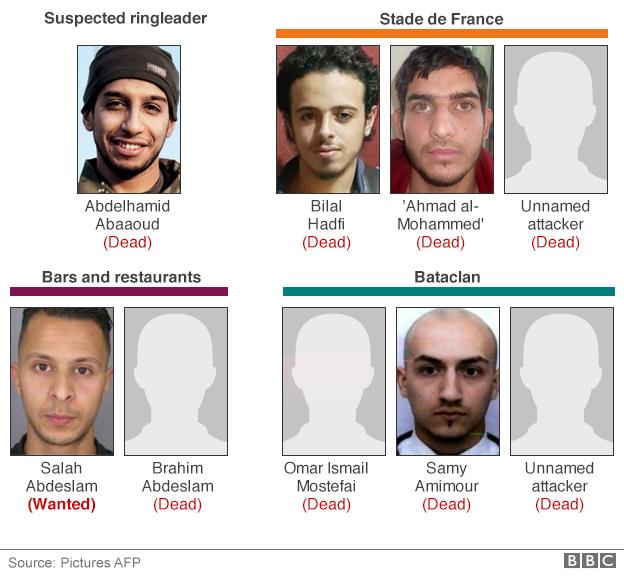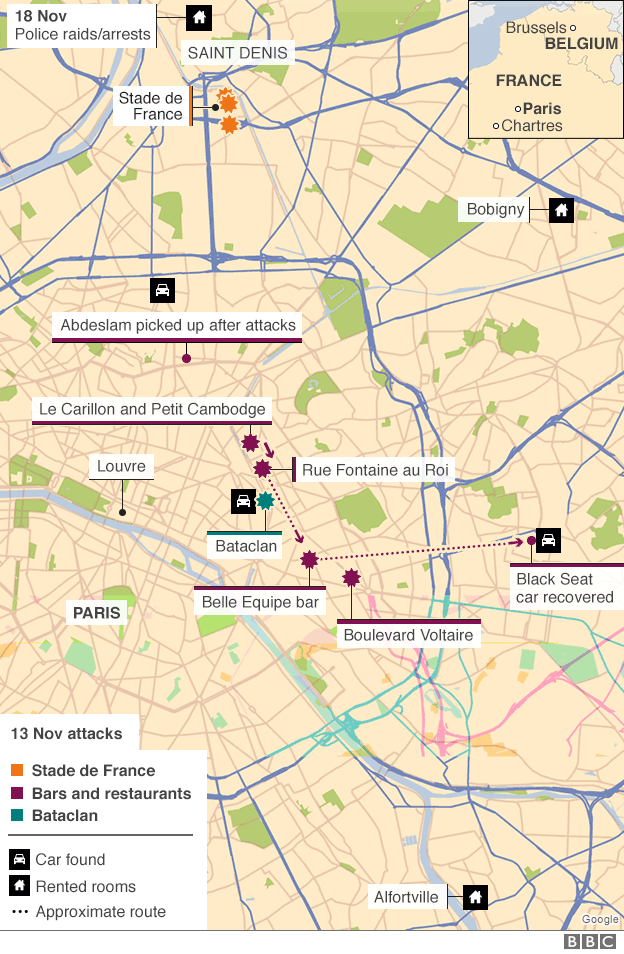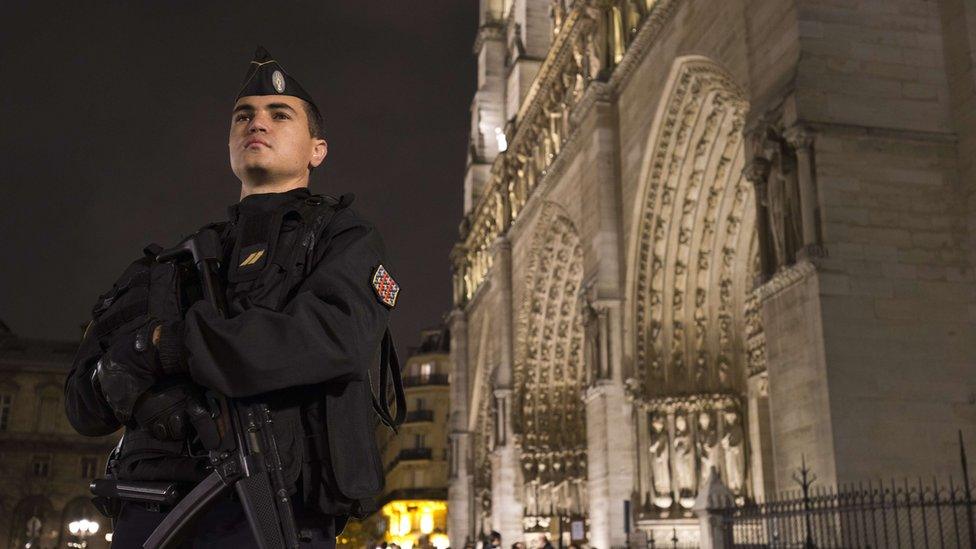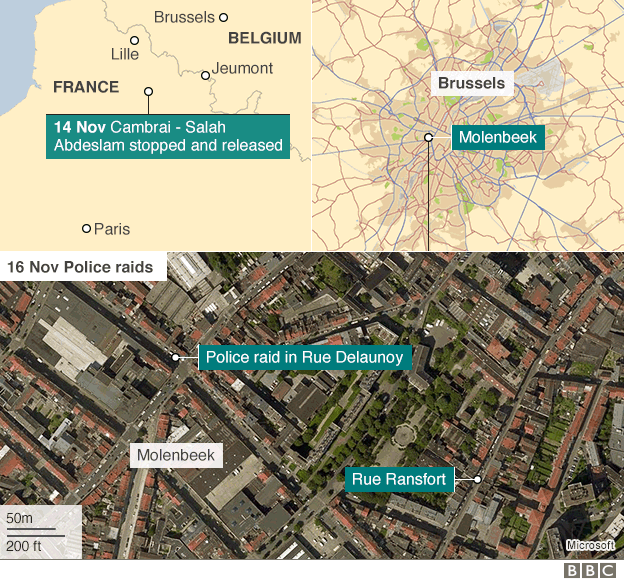Paris attacks: Europe ponders security challenge
- Published
Paris attacks: Who was Abdelhamid Abaaoud?
There was applause for the French security services and police in the National Assembly on Thursday when it was announced that they had caught - and killed - the planner of the Paris attacks, Abdelhamid Abaaoud.
But the focus on the manhunt - and the shock and grief inspired by the attack - cannot hide the fact that there are also major questions about the atrocities and the response which lie unanswered.
One set of questions relate to whether France could have detected such a large plot.
After attacks in the UK, there are often questions about "intelligence failures". The 7/7 attacks in 2005 sparked multiple investigations after it emerged that some of those responsible had been "on the radar" of the security services and police. Similar questions were asked after the killing of Lee Rigby in May 2013.
The cell behind the Paris attacks appears to have been built around individuals who had gone from France and Belgium out to Syria, received training and then been sent back.
Former French intelligence officials acknowledge in this case that there was a failure. Men who were known to the authorities managed to travel and plan and then carry out a deadly attack.



But the reasons for this partly lie in the scale of the challenge France faces. The authorities say they are dealing with 11,000 extremists on their radar. Working out who to follow amidst so many is a challenge for any security service.
The problems with travel into and inside Europe's Schengen area pose an additional challenge, along with that of weak information-sharing amongst countries.
Co-ordinated attack
In the past, attacks were inspired by the so-called Islamic State (IS) but this one was different - it was directed and organised by the group.
From the start it was clear that it was highly organised and sophisticated - not the work of so-called "lone actors", but a group working together.

Abaaoud may have been the ringleader but it is not clear yet if there was further supervision and direction from the top of IS. Learning that could help the process of discovering whether there are other cells who have been sent to undertake similar operations in France or other countries.
Algerian legacy
France does have experienced security services because it has been dealing with the threat of jihadism longer than most. The legacy of the conflict in Algeria always made it a target.
In the mid-1990s, a series of attacks rocked Paris with bombs on the subway. These were linked to Algerian groups whose reach often extended to the UK.
With figures like Abu Qatada and Abu Hamza radicalising and preaching, the French christened the British capital "Londonistan" and chided it for offering a safe haven so long as no violence was directed its way.
France sent its spies undercover to try to penetrate the groups in Britain and pushed for more action. British officials only understood the danger after 9/11 though and belatedly began acting.
Meanwhile France managed to successfully avoid major attacks in those years at the same time as London and Madrid were hit.

More on the Paris attacks

Who were the victims? Tributes paid to those who lost their lives
A doctor's story An emergency department medic describes his Friday night shift
Rethinking strategy Time for West to review its priorities in Syria
How vulnerable is Europe? Putting the dangers in perspective
What happened in Paris? How events unfolded on Friday evening in the French capital
Shoot-out in Saint-Denis How the raid on suspects unfolded

Lack of integration
The French Security Service enjoyed a robust reputation for running extensive networks of informers across mosques and the Muslim community and keeping an eye on emerging problems.
But at the same time, the lack of integration and the sense of alienation and discontent in some parts of France's large Muslim community was also a worry to security officials.
The French tradition of secularism and integration is often contrasted to what used to be thought of as British multiculturalism, but both countries have had their own challenges.

In the wake of the attacks, security services have been stepped up in Paris and across Europe
The arrival of the Syrian conflict drove the problem to a new level. The estimates are that around 1,000 people have gone from France to Syria - a figure higher than the UK (where the estimates are 750-800).
The number of attacks was rising before Paris - with shootings in Toulouse and stabbings before this year, when the scale of the threat became apparent with the Charlie Hebdo killings and now these atrocities.
Border challenges
The use of neighbouring Belgium as a base is another challenge. The Belgian state is weaker, its security services less experienced.



And this highlights the wider issue that France's security situation cannot be separated from the challenges of Europe - particularly when it comes to border controls which allow the movement of jihadists and also weapons.
Closing these loopholes has now become a top priority for the French government. We are also likely to see much more sharing of information from all security and intelligence services to try to chase down leads.
All security services across Europe are on edge now. They are all asking whether this was one network or if there are more. They will all be looking again at those who have gone out to Syria and come back.
IS has been under pressure on the ground in Iraq and Syria with heavier air strikes and pushes by Kurds and others on the ground. That may make it harder for the group to organise but it could also drive it to further so-called asymmetric attacks in the forms of terrorism.